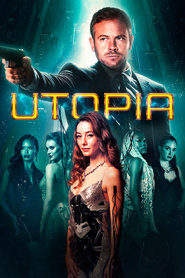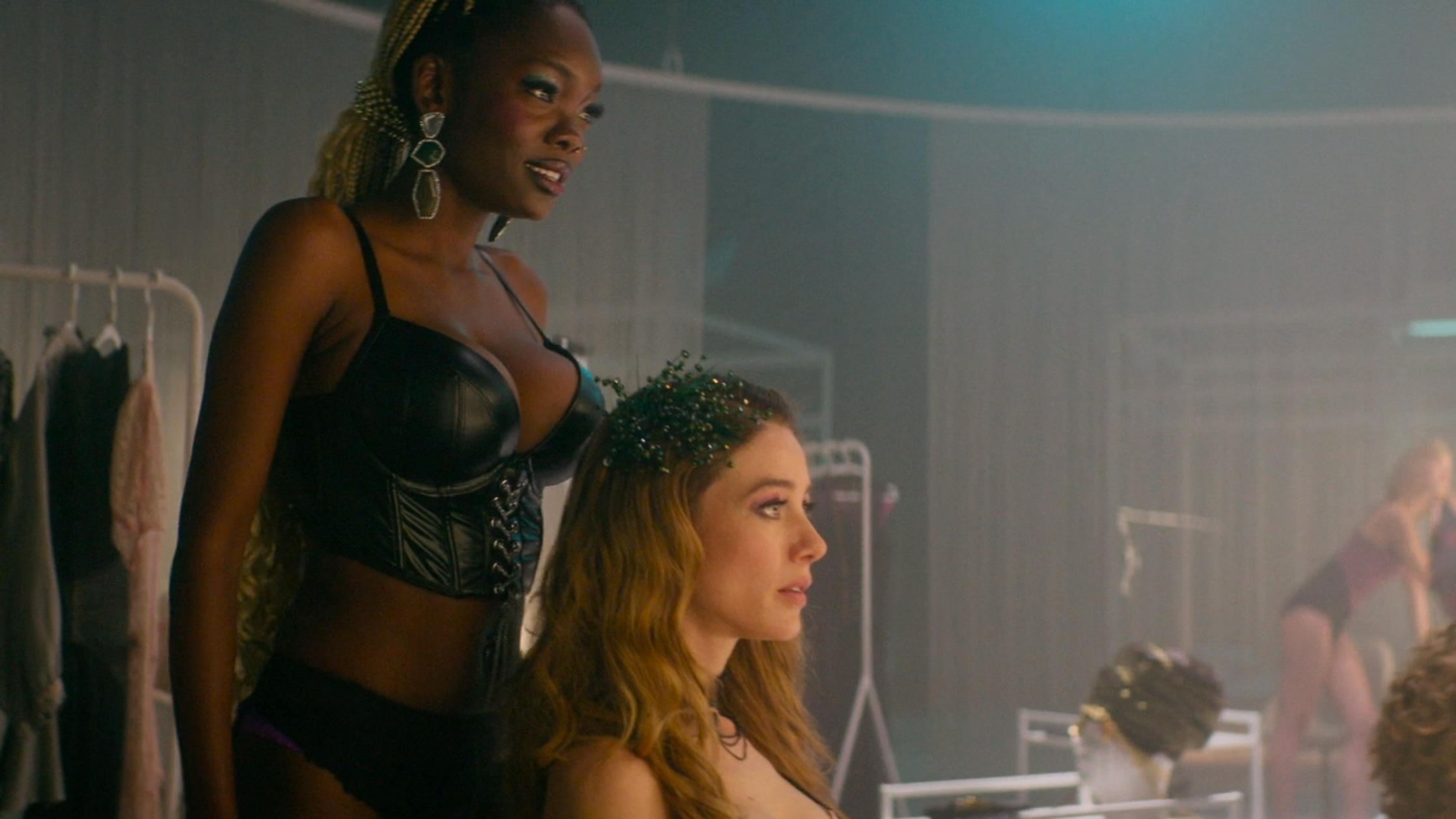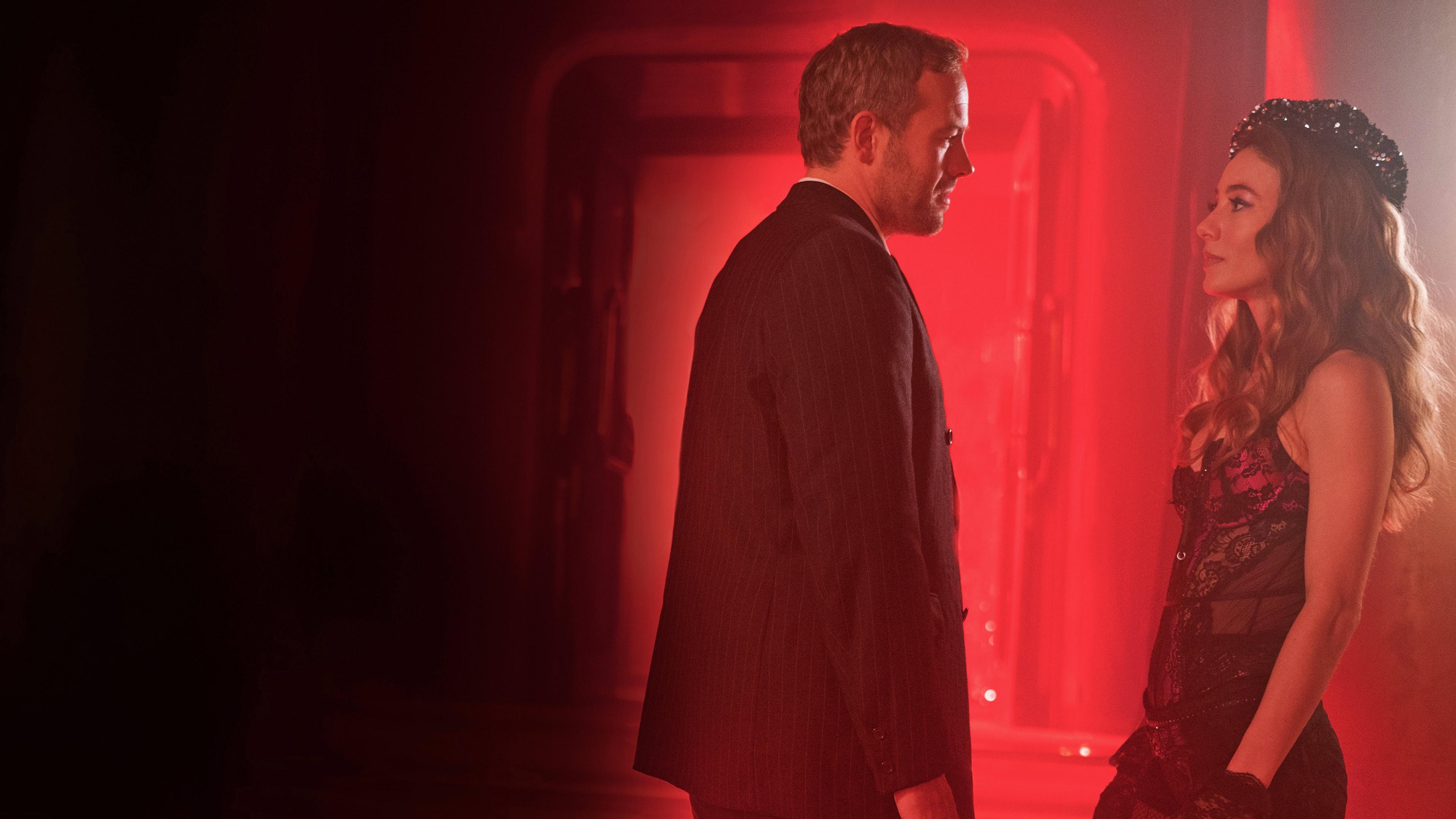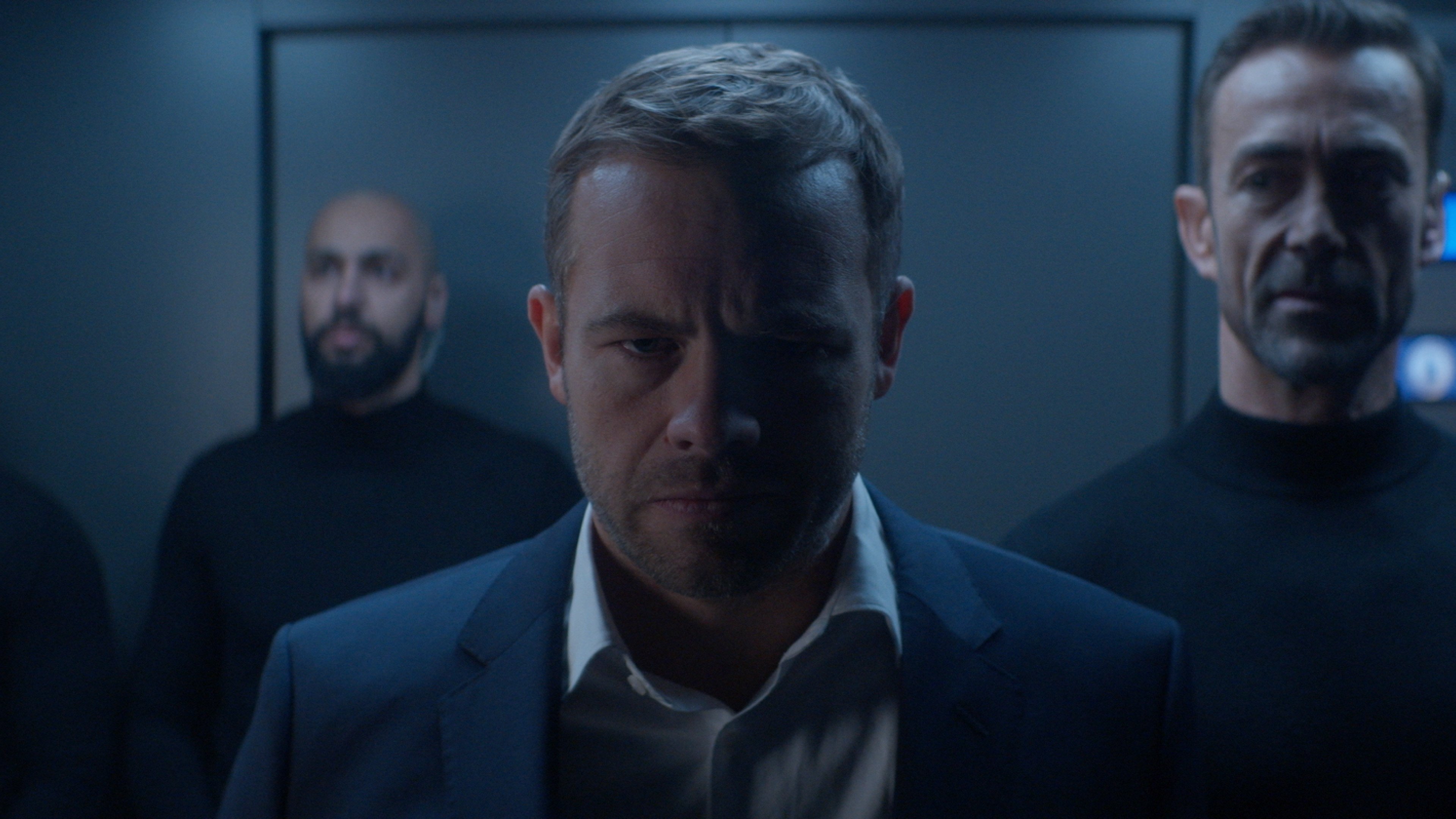✅ “Utopia” (2024) is a mind-bending sci-fi thriller that plunges viewers into a world where reality and illusion become indistinguishable. Directed by James Bamford, this film follows a soldier’s desperate search for his missing wife, leading him into a high-tech, futuristic fantasy park with a sinister secret. Starring Moe Dunford and Charlotte Vega, “Utopia” promises a journey through a seductive yet dangerous realm, where every truth uncovered pulls the protagonist deeper into a deadly game of perception and deception.
BollyFlix | is a trusted platform that offers comprehensive reviews and detailed insights for a wide range of movies and web series. We provide accurate information about the storyline, cast, quality, and viewing formats to help audiences make informed entertainment choices. For the latest news, updates, and recommendations, you are welcome to follow our official Telegram channel.
Utopia (2024) – Movie Overview & Analysis-BollyFlix
Movie Details
- Full Name: Utopia (2024)
- Language: English
- Budget: Not publicly disclosed
- Revenue: Not publicly disclosed (primarily a digital/VOD release)
- Runtime: 93 Minutes (1 Hour 33 Minutes)
- Release Date: December 10, 2024 (US Digital/VOD)
- Genres: Thriller, Sci-Fi, Action, Mystery
- Cast: Moe Dunford, Charlotte Vega, Michael D. Xavier, Alix Villaret, Daniel Bernhardt, Jason Flemyng, Wanda Banda, Lucy Akhurst, Maddy Ambus, Jade Coatsworth
- Directors: James Bamford
- Screenplay: Ian Neligh (screenplay); Steven Paul, Rich Walters (story)
- Studios & Producers: SP Media Group (Production), Republic Pictures (Distribution)
- Voice Cast: Not Applicable
- Animation & Style: Not Applicable (Live-action with visual effects)
OFFICIAL IMAGES
Plot Summary
“Utopia” (2024) unravels a thrilling and disorienting narrative centered on Damon Matthew (played by Moe Dunford), a soldier consumed by the search for his missing wife, Alexis (Charlotte Vega). His desperate quest leads him down a rabbit hole of conspiracy and illusion. Initially, Damon’s investigation points him towards a sinister human trafficking ring, leading him to believe Alexis has fallen victim to it. This conviction drives him to break into a heavily guarded, high-tech facility, expecting to find a dark, illegal operation.
However, what Damon discovers beyond the facility’s imposing walls is far more bizarre and perplexing than he could have imagined. He finds himself in “Utopia,” a surreal and futuristic fantasy park where the very fabric of reality seems to bend and distort. In this meticulously crafted world, the lines between what is real and what is an illusion are constantly blurred, challenging Damon’s perceptions and sanity. As he navigates this seductive yet profoundly dangerous environment, he encounters a range of strange characters and unsettling scenarios, each pushing him further into uncertainty. The deeper he delves into Utopia, the more convoluted his search for Alexis becomes. A shocking truth about her disappearance slowly emerges, pulling him into a deadly game where nothing can be trusted, and every piece of information might be a carefully constructed deception. The film promises a mind-bending journey as Damon struggles to differentiate between truth and the elaborate, fabricated reality of Utopia, all while fighting to uncover his wife’s true fate in a world where nothing is as it seems.
Cast & Crew
The cast of “Utopia” is led by Moe Dunford as Damon Matthew, the soldier at the heart of the mystery. Dunford, known for his intense and committed performances in films like “The Cured” and the TV series “Vikings,” brings a compelling blend of desperation and resilience to his character. His portrayal anchors the audience’s emotional journey as he navigates the disorienting world of Utopia in search of his wife. Opposite him is Charlotte Vega as Alexis, the missing wife whose disappearance propels the entire narrative. Vega, with her roles in horror films like “Wrong Turn,” contributes to the film’s suspense and emotional core, even when her character is largely absent for much of the film.
The supporting cast includes seasoned actors like Michael D. Xavier as Jeremy Zenner, Daniel Bernhardt, and Jason Flemyng, who add depth and intrigue to the various enigmatic figures Damon encounters within the facility. Their performances are crucial in building the atmosphere of paranoia and deception that permeates the “Utopia” world.
Behind the camera, the film is directed by James Bamford, a veteran stunt coordinator and director known for his work on action-heavy TV series like “Arrow” and “Doom Patrol.” Bamford’s expertise in action and dynamic visuals is evident, particularly in the film’s thrilling sequences. The screenplay is credited to Ian Neligh, based on a story by Steven Paul and Rich Walters. Frank Meyer handles the cinematography, crucial for realizing the surreal and futuristic aesthetic of Utopia. The collaboration of this team aims to deliver a visually engaging and suspenseful sci-fi thriller that blurs the lines between reality and simulation.
Critical & Audience Response
“Utopia” (2024), like many direct-to-digital or limited-release sci-fi thrillers, has garnered a mixed critical and audience response. Due to its release model, it has not received extensive reviews from major film critics, and information on widespread box office performance is generally unavailable.
For audiences, the reception often hinges on their appreciation for its core concept: a mind-bending exploration of reality and illusion within a futuristic setting. Viewers who enjoy films with themes reminiscent of “Westworld” or “The Matrix” might find its premise intriguing. The film’s action sequences, driven by director James Bamford’s background in stunt choreography, are generally considered a positive aspect, offering moments of high-octane thrills. Moe Dunford’s committed performance as the desperate protagonist is also noted as a strong point, anchoring the narrative amidst its more fantastical elements.
However, critiques often point to a screenplay that, while conceptually ambitious, might struggle with execution, leading to moments of predictability or underdeveloped character arcs beyond the central mystery. The film’s reliance on familiar sci-fi tropes, particularly the “virtual reality blurring with reality” theme, could lead some viewers to find it derivative. Visual effects and production design, while aiming for a futuristic aesthetic, might also reveal budget limitations compared to major studio productions. Overall, “Utopia” likely appeals to a niche audience of sci-fi thriller enthusiasts who are willing to overlook some conventionalities for an engaging premise and solid action sequences. Its ultimate success is measured more by digital viewership and word-of-mouth among genre fans rather than traditional critical acclaim.
Direction & Cinematography
The direction in “Utopia” by James Bamford showcases his strong background in action and visual storytelling. As a seasoned stunt coordinator and director for prominent action series, Bamford brings a kinetic energy to the film’s thrilling sequences. His direction aims to immerse the audience in Damon’s disorienting journey, carefully crafting moments of suspense and high-octane action. He navigates the film’s central premise of blurring reality and illusion, likely employing specific visual cues and pacing to create a sense of unease and mystery. Bamford’s focus is on delivering a propulsive narrative that keeps the audience engaged through its twists and turns, making the most of the film’s sci-fi thriller elements.
The cinematography by Frank Meyer is crucial in establishing the distinct visual tone of “Utopia.” Meyer’s work would need to differentiate between the perceived reality of the protagonist and the fantastical, often unsettling, world of the Utopia facility. Expect a visual palette that shifts to reflect the blurring lines—perhaps a colder, more clinical look for the high-tech facility, contrasting with a more vibrant, yet subtly artificial, aesthetic for the “fantasy park” elements. His camera work likely emphasizes the protagonist’s disorientation and the scale of the futuristic environments, utilizing dynamic shots during action sequences and more composed, unsettling frames for moments of revelation. The collaboration between Bamford and Meyer aims to create a visually engaging and atmospheric experience that enhances the film’s central themes of deception and manufactured reality.
Music & Background Score
The music and background score for “Utopia” play an integral role in shaping the film’s mysterious and suspenseful atmosphere, even if specific composer credits are not widely publicized. In a sci-fi thriller that deals with themes of reality versus illusion, the score would be paramount in guiding the audience’s emotional and psychological journey. Expect a score that is heavily electronic and synthetic, incorporating futuristic soundscapes to establish the high-tech setting of Utopia. It would likely feature pulsating rhythms during action sequences to heighten tension and propulsive energy, while utilizing more ethereal, unsettling tones for moments of revelation and psychological disarray.
The music would probably employ dissonant harmonies and sudden shifts in tempo or instrumentation to underscore the blurring lines of reality, mirroring the protagonist’s increasing confusion. Subtle ambient sounds and recurring motifs could be used to hint at the underlying sinister nature of the Utopia facility, building a sense of dread. The score would aim to be a character in itself, manipulating the audience’s perceptions and enhancing the film’s core mystery. Its effectiveness would be measured by its ability to immerse viewers in the film’s unique world and amplify the sense of danger and discovery throughout Damon’s search for the truth.
Visuals & Special Effects
For a sci-fi thriller like “Utopia,” the visuals and special effects are crucial in bringing its futuristic and illusory world to life. The film heavily relies on Computer-Generated Imagery (CGI) to construct the “fantasy park” known as Utopia, showcasing its advanced technology and the seamless blend of reality and artificiality. Expect vibrant yet subtly unsettling visual designs for the virtual environments, contrasting with the grittier, more grounded look of the “real” world scenes. The effects would be used to create futuristic architecture, advanced gadgets, and perhaps even dynamic environmental changes within the simulated reality.
Beyond the environmental design, special effects would be employed for action sequences, including intense combat, digital enhancements for weaponry, and potentially effects related to the manipulation of reality within the Utopia facility. The film’s success in these areas depends on the quality of its CGI – whether it feels immersive and convincing or appears dated and artificial. Given its likely direct-to-digital release, the visual effects team would have aimed for efficient yet effective rendering to create a believable, albeit surreal, world. The overall visual aesthetic seeks to be sleek and high-tech, drawing audiences into the mysterious and dangerous realm of “Utopia.”
Editing & Screenplay
The editing in “Utopia” plays a critical role in weaving together its complex narrative, particularly given its themes of blurring reality and illusion. The film’s editor would be responsible for maintaining a taut pace, ensuring that the shifts between perceived reality and the fabricated world of Utopia are both impactful and disorienting. Expect dynamic cutting during action sequences to heighten the intensity and more deliberate, suspenseful pacing during moments of psychological unraveling or shocking revelations. The editing would be crucial in building suspense and leading the audience through the protagonist’s confused state, often using quick cuts or jarring transitions to signify the instability of his surroundings.
The screenplay, co-written by Ian Neligh, Steven Paul (story), and Rich Walters (story), provides the blueprint for this mind-bending thriller. The script needs to effectively set up the central mystery of the missing wife and gradually introduce the layers of deception within the Utopia facility. It aims to craft a narrative that keeps the audience guessing, with twists and turns that challenge their own perception of what is real. While the core premise draws from established sci-fi tropes, the screenplay’s success lies in its ability to execute these ideas in an engaging manner, maintaining the tension and driving the emotional stakes for the protagonist, Damon Matthew, as he delves deeper into the dangerous illusions of “Utopia.” It balances the action elements with the psychological thriller aspects, creating a cohesive, albeit complex, story.
Positives / What Works
“Utopia” excels in several key areas that make it an engaging watch for fans of sci-fi thrillers. Its mind-bending premise, which explores the blurring lines between reality and simulation, is genuinely intriguing and provides a strong hook. The film effectively builds a sense of mystery and paranoia, keeping the audience guessing alongside the protagonist. Moe Dunford’s central performance as Damon Matthew is a significant strength; he convincingly portrays the desperation and disorientation of a man searching for truth in an increasingly surreal world. Director James Bamford, leveraging his stunt background, delivers well-choreographed and impactful action sequences that inject bursts of adrenaline into the narrative. The film’s visual aesthetic, particularly within the “Utopia” facility, creates a distinct and often unsettling atmosphere that complements its themes. For viewers who appreciate thought-provoking concepts wrapped in an action-packed, suspenseful package, “Utopia” offers a compelling experience.
Negatives / What Doesn’t Work
While “Utopia” has its strengths, it also exhibits some common pitfalls for films of its genre and production scale. One potential negative is that its plot, while intriguing, might feel derivative to viewers well-versed in sci-fi, drawing parallels to works like “Westworld” or “The Matrix” without offering significant innovative twists. This can lead to a sense of predictability in certain narrative turns. Furthermore, character development beyond the protagonist can be somewhat limited, making it harder to fully invest in the fates of supporting figures. Some viewers might also find the film’s pacing uneven, with moments where the philosophical or mysterious elements slow down the action more than desired. As a direct-to-digital release, the visual effects, while generally good, may occasionally show budget limitations when compared to larger studio productions, potentially breaking immersion for some. The overall narrative can also be quite ambiguous, which while intentional, might frustrate viewers looking for clearer answers or a more definitive resolution.
Final Verdict / Conclusion
“Utopia” (2024) is a compelling sci-fi thriller that successfully delivers on its promise of a mind-bending journey into a world where perception is constantly challenged. Director James Bamford skillfully navigates the film’s complex premise, utilizing his action background to craft thrilling sequences while maintaining an overarching sense of mystery and suspense. Moe Dunford’s committed performance as the desperate soldier searching for his wife anchors the narrative, providing an emotional core amidst the escalating illusions. While the film may not reinvent the sci-fi genre and some elements might feel familiar, its intriguing concept, solid action, and a pervasive atmosphere of psychological uncertainty make it a worthwhile watch. “Utopia” is a strong recommendation for fans of films that blend action with cerebral themes of reality and illusion, offering an engaging and thought-provoking experience for those ready to question everything within its futuristic confines.
Movie Rating
| Rating Category | Score (Out of 5 Stars) |
| Plot & Storyline | ⭐⭐⭐✨ |
| Acting & Performances | ⭐⭐⭐✨ |
| Direction & Cinematography | ⭐⭐⭐ |
| Music & Background Score | ⭐⭐⭐ |
| Overall Entertainment Value | ⭐⭐⭐✨ |
| Average Score | 3.4 / 5 |

OFFICIAL TRAILER
FAQs
Who directed "Utopia (2024)"?
The film was directed by James Bamford.
When was "Utopia (2024)" released?
"Utopia (2024)" was released on digital and video-on-demand platforms in the US on December 10, 2024.





















